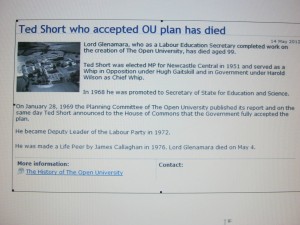End of an era, or repetition of an error?
Wednesday, May 30th, 2012Many people have clear ideas about what they think that the OU has done, its history. These are reflected in their views about its future. For example, it is argued here that ‘the Open University is trying to poach full-time students from “traditional brick universities’. Competition for students was not invented by the OU and throughout its life the OU (open to people) has resisted treating students simply as objects to be poached or assumed that some adult learners automatically belong elsewhere. Doug Clow proposed another approach and others noted that the OU was cheaper than other universities in England but the ‘thought slash blog’ continued to present the increase in fees as ‘the end of the OU as we know it — but only for students that live in England’, here. Understanding the shift in funding towards individual learners and away from taxpayers as part of a longer and wider trend could help us gain a better sense of its implications. Presenting change in terms of a drama of epochal moments may be less useful.
